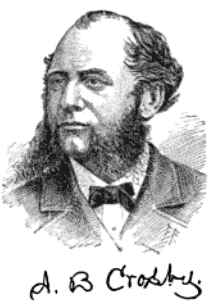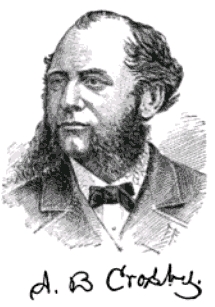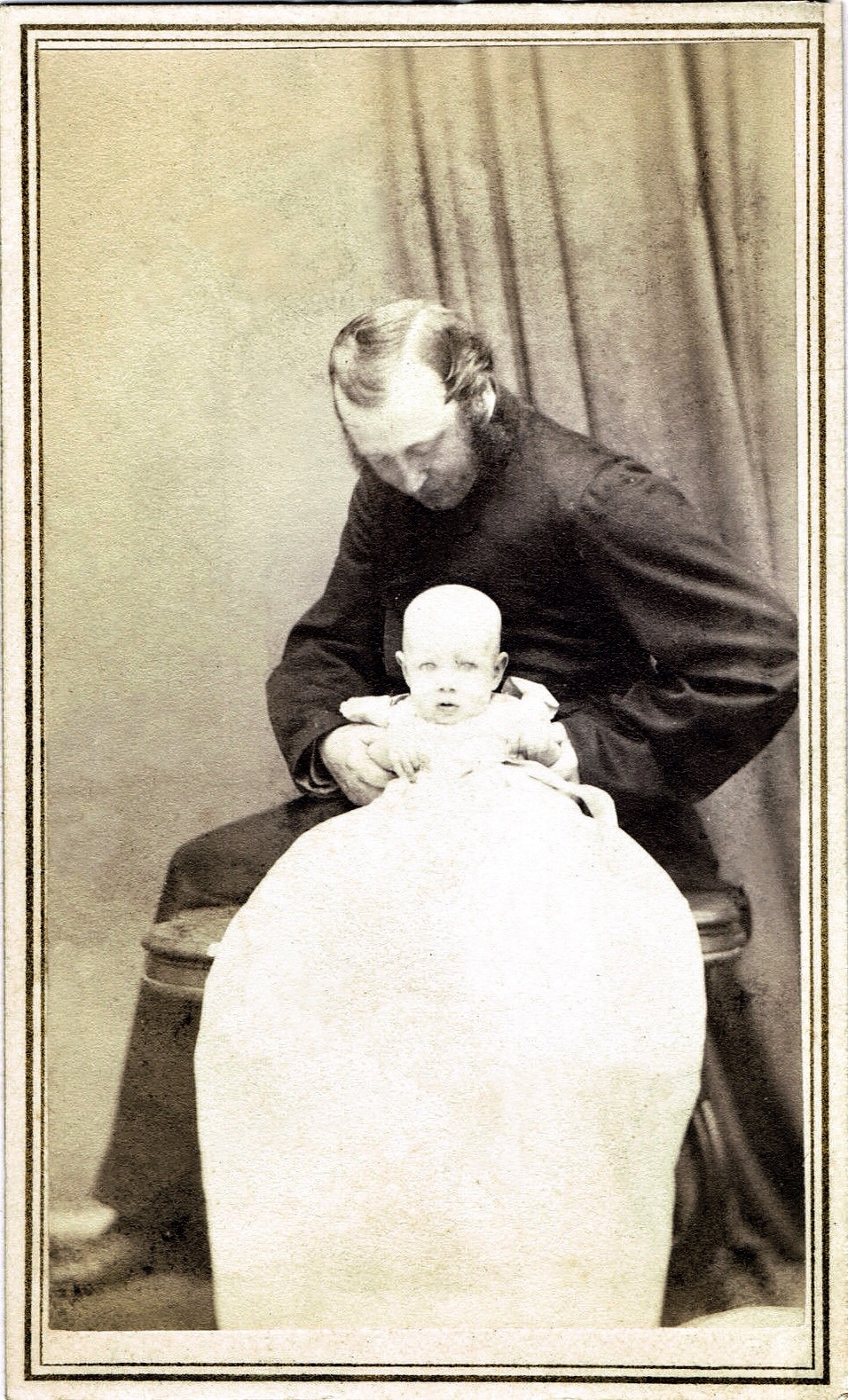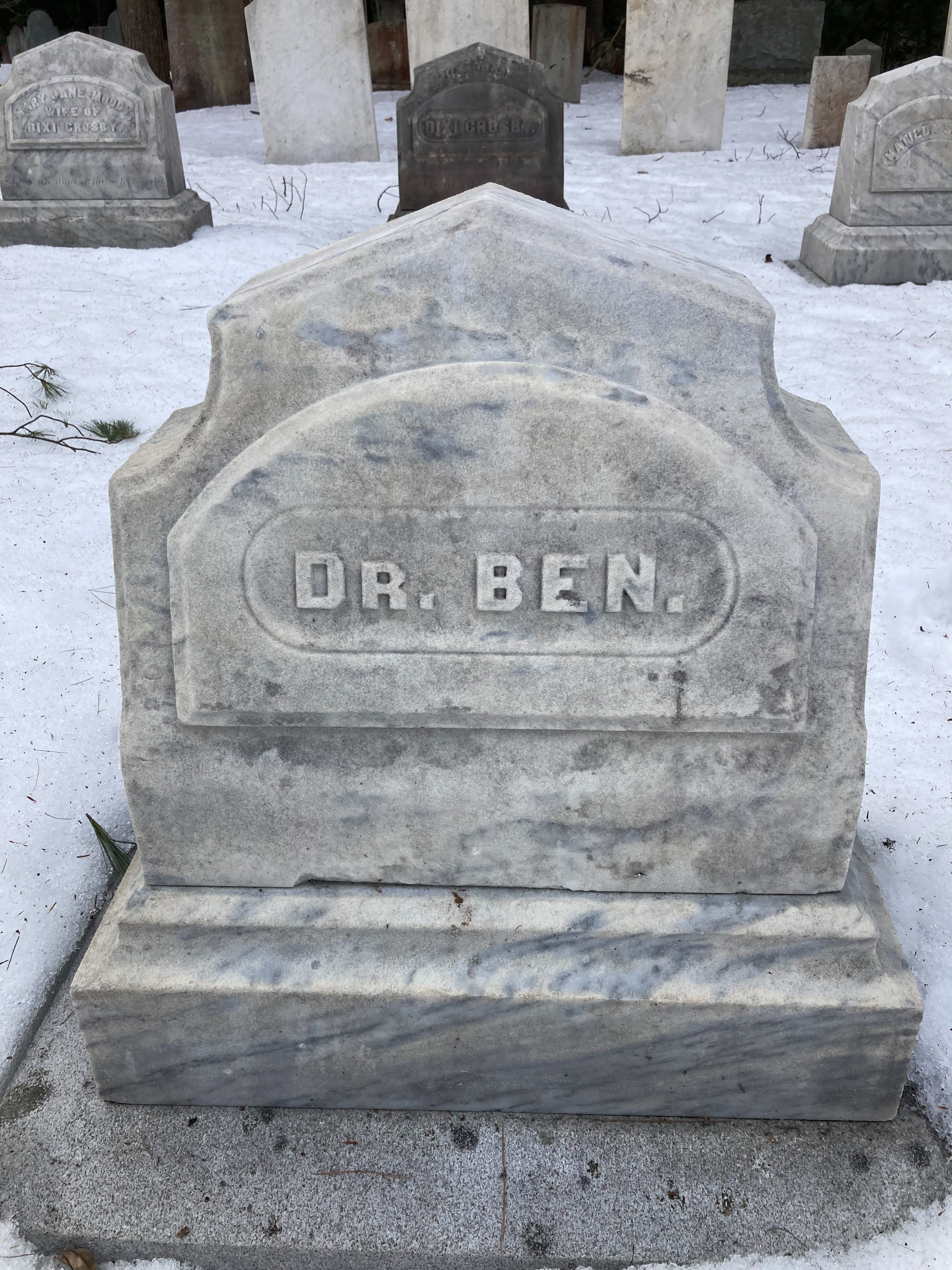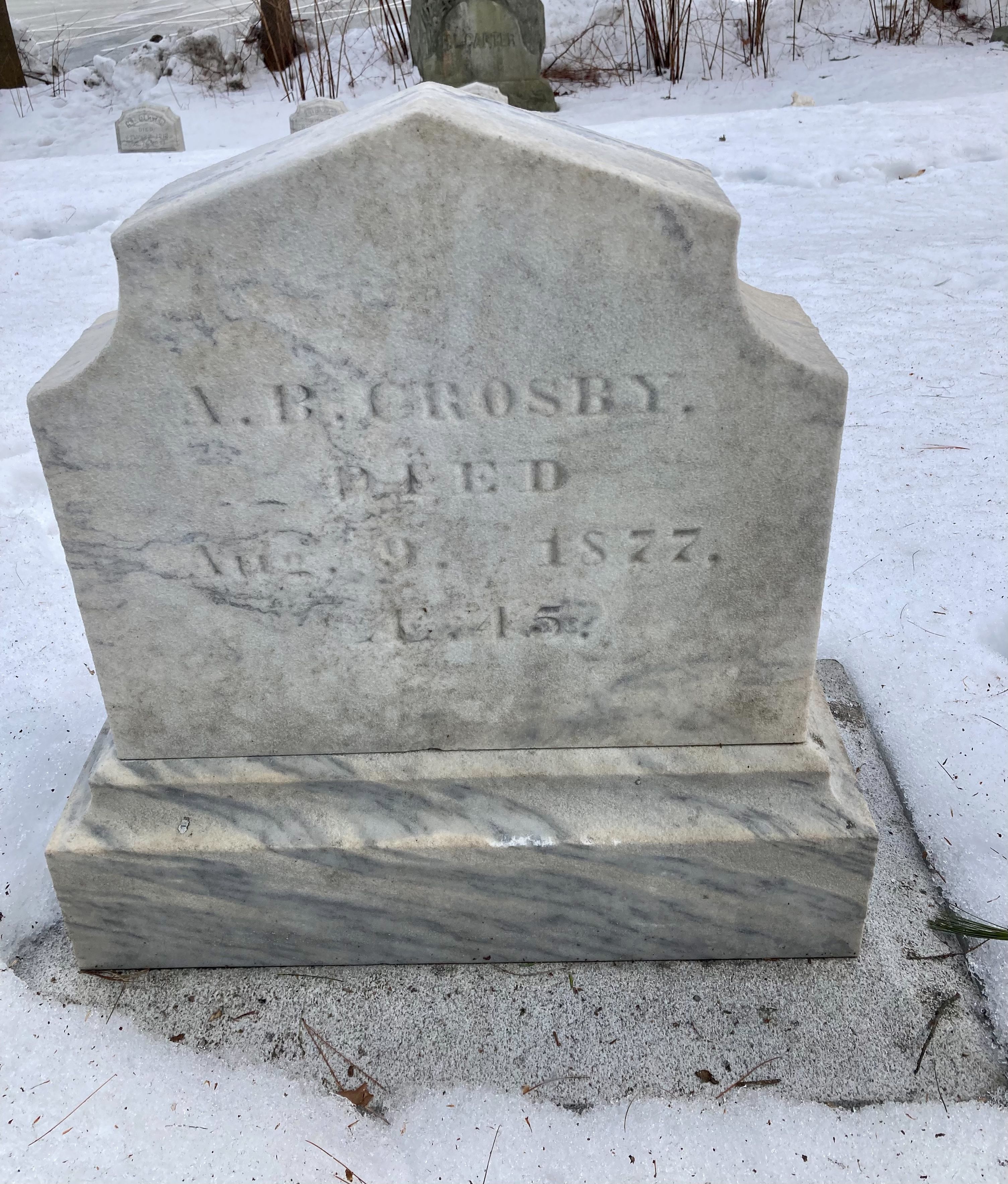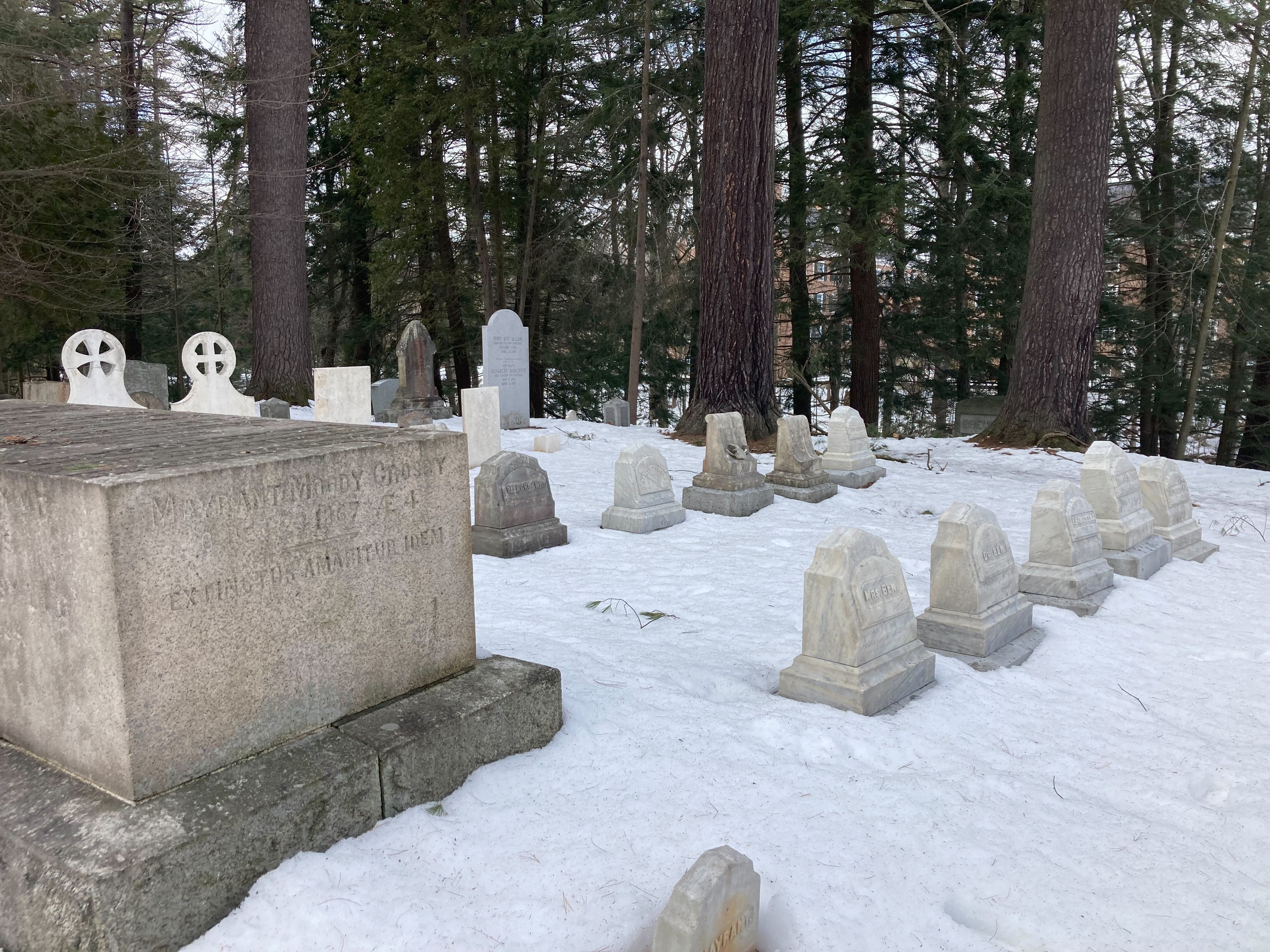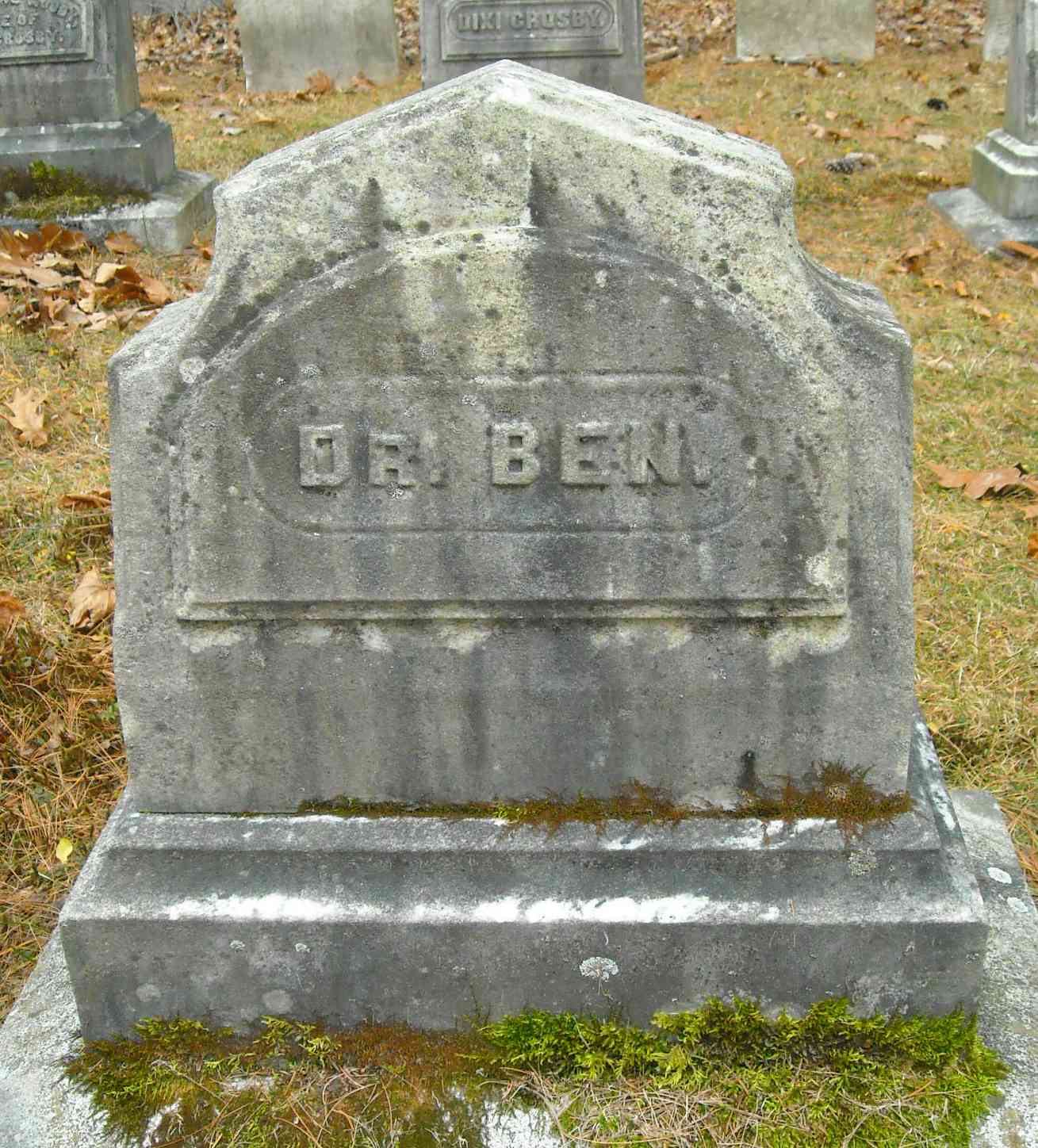Returning to Hanover, he began practice, but at the beginning of the civil war joined the 1st New Hampshire volunteers as surgeon, and was afterward promoted to brigade-surgeon. In 1862 he resigned, and became associate professor of surgery to his father, who was professor of surgery and anatomy in Dartmouth.
On his father's death, in 1868, he became his successor, and occupied the chair until 1877. Dr. Crosby was also, in 1866-'72, a professor in the University of Vermont, in 1869-'70 a lecturer in the University of Michigan, in 1869 a professor and lecturer in Bowdoin college, in 1871-'2 a professor in the Long Island college hospital, and in 1872-'7 professor of anatomy in Bellevue hospital medical college. In June, 1877, he presided at the annual meeting of the New Hampshire medical society, and delivered an address upon "The Ethical Relations of Physician and Patient." Many of his medical lectures have been published.
m Mildred Grassell Smith on 26 Jul 1862
Children:
- Mayrant Moody Crosby (1863–1867)
- Mildred Morton Crosby (1865-) m Edward Lindsey
- Dixi Crosby (1869–1900)
- William Pierce Crosby ( 1874–1914)
died of acute diabetes
Source:
- Memorial sketches and history of the class of 1853, Dartmouth College By Moses Thurston Runnels (1895)
- Appletons' cyclopaedia of American biography, Vol. II, New York, D. Appleton and Company, 1887
---
Alpheus Benning Crosby was born in Gilmanton, N. H., February 22, 1832. He was a son of Dixie Crosby, and grandson of Dr. Asa Crosby, all New Hampshire men, and while here we lose the professional thread of the ancestral line, we find that his great-grandfather was a soldier, first, in the old French and Indian War, and later as an officer in the Revolutionary army, commanding a company in Colonel Reed's New Hampshire regiment, in which, together with two of his older sons, he did noble service at Bunker Hill. "Tracing the line of succession still further, through four more generations of New England's strong-armed, strong-willed sons, we reach at length their pioneer, Simon Crosby, who in 1635, with his wife Ann, left Lancashire, and, crossing in the good ship 'Susan and Ellyn,' settled, at the age of twenty-six, in Cambridge,
Mass.
When Dr. Ben, as he was familiarly called by all, who knew him intimately, was six years of age, his father received an appointment to the chair of surgery of Dartmouth College, as the successor of R. D. Muzzey; the Crosby family left Gilmanton and ever after resided in Hanover.
It was an ideal home. What that home implies, those of us who remember the Crosby mansion as a 'House Beautiful' among the 'Delectable Mountains' of the river border, need not now be reminded. Whether we sought it as strangers and pilgrims, or as social visitors; as students, or as office boys; as invalids, seeking kind words and quick relief, or as friends, privileged to go in and out, in all the delightful confidence of the household, our recollection of it brings the same throb of pleasure.
The picture of that country home, with its fair surroundings and embellishments; its quiet dooryard, shaded with elms and horse-chestnuts; its ever-open door, to the call of hospitable or professional claim; its threshold, trodden by more distinguished feet, perhaps, than any single portal in the state; its crowds of visitors; its social and family gatherings: its daily music of conversation and merriment, all make that dear old homestead a dream of delight to him who
whiled away the summer hours of life's morning under its shadow; a very Mecca to those who under its roof-tree began their professional pilgrimage, and a shrine of sweet memories to us all.
He was graduated from the classical department of Dartmouth College in 1853, and at once commenced his medical studies in the office of his father, who was professor of surgery in the medical department of Dartmouth College. He attended lectures both at Dartmouth and at the College of Physicians and Surgeons in New York City, and served for one year as an intern in the United States Marine Hospital, at Chelsea, Mass., and was graduated from Dartmouth Medical College in the class of 1856.
At the outbreak of the Rebellion, in 1861, he was appointed surgeon of the First Regiment of New Hampshire Volunteers for three months' service. This being concluded, he was at once commissioned as brigade surgeon of United States Volunteers, and soon after appointed to the rank of medical director, serving as such on the staffs, successively, of Generals Stone, Casey, Sedgwick and Peck. His army service was marked by the same strong individuality, the same resolute activity, the same executive talent, which we have seen stamped upon the boy and the youth. Added to all these other qualities, was that same genial humanity which made friends of everyone. His brother officers trusted him, depended upon him, and loved him. The private soldiers idolized him, for they saw his quick and constant sympathy for them, and knew that his large and loving heart embraced them all in its tender care, always seeking their comfort and well being, whether in camp or in the field.
As might be expected of a man having such marked individuality, his was a noble record of army service, and through him to New Hampshire belongs the credit of having erected the first complete military hospital on the modern "pavilion plan" that was built during the War of the Rebellion. In a paper presented to the New Hampshire Medical Society, entitled "A Lost Art in Surgery," is found the following description of this hospital from his own pen: "In the summer of 1861, being the first year of our civil war, I was assigned as division surgeon to the staff of General Charles P. Stone, then commanding a corps of observation at Poolesville, Md. As we were thirty-six miles from Washington, and as the general hospitals in that city were at the time crude and unsatisfactory, I conceived the idea of establishing a division hospital on the ground, and so retain for care and treatment both our sick and wounded.
In August, 1861, I made a communication to Surgeon Tripler, who was the medical director of the army, at Washington, submitting my plan for the construction of a hospital, and asking for the necessary lumber, doors, windows, etc., with which to construct it. The plan was approved; my requisitions were endorsed, and the necessary materials furnished. The work was completed, and on the twenty-first of October, the day on which the battle of Ball's Bluff took place, we were
ready to receive the wounded from that ill-fated engagement. This hospital was built essentially on what is now known as the pavilion plan, though I was at the time ignorant of the action which the sanitary commission was taking in the same direction, I have recently learned that the sanitary commission made a communication to the government in July, 1861, advocating the use of pavilion hospitals, and in October following, about the time my hospital was completed and occupied, secured an order for the construction of a hospital on the pavilion plan.
I have given these details, because from them it appears that my own hospital was built and occupied before any of those suggested by the sanitary commission, and, so far as I know, was the first hospital of the kind erected during the war."
On the 26th of July, 1862, Dr. Crosby was united in marriage with Miss Mildred Grassell Smith, a native of Alabama, and daughter of Dr. William R. Smith, who was afterwards, and until his death in 1875, a resident of Galveston, Texas. Children, three: Mildred, Dixi, and W. Pierce.
Dr. Crosby resigned from the United States service the day preceding his marriage, and in the autumn of the same year was appointed adjunct professor of surgery in Dartmouth Medical College.
In 1865, he was invited to the chair of surgery in the University of Vermont, and in the same year to a similar chair in the University of Michigan. Both these positions he accepted and ably filled for several years. In 1870, on the resignation of his father, he was appointed to the chair of surgery in Dartmouth, and also delivered a course of surgical lectures in the medical department of Bowdoin College, Maine, the same year. He also held appointments in surgery and surgical anatomy in the Long Island Medical College, the New York University, and also in Bellevue Hospital Medical College of New York City.
Prof. Henry E. Parker of Dartmouth College, chaplain of the Second N. H. Vols., with much force and feeling, remarked on the day of Dr. Crosby's burial: "It is no small encomium for any man, when the place where he has grown up, and in which he has spent both his earlier and riper years, has no recollection of him other than what is to his praise."
In closing this sketch, the writer desires to acknowledge his obligation to Dr. J. Whitney Barstow, resident physician of Sanford Hall Asylum, New York, for facts relative to Surgeon Crosby in his memorial address before the New Hampshire Medical Society. Dr. Barstow only echoed the feelings of the profession throughout the state and New England, when he spoke of his college classmate and professional friend in the following language: "His sun was then in its zenith; he had climbed easily the ladder of professional fame, and stood in the full glory of
mature manhood. A few days later the tidings reached us, unwarned, that that sun had gone down suddenly at midday, and left us stunned and blinded by the shock, as when the bolt from heaven drops from a clear sky and rends the oak at our very threshold."
Dr. Crosby died in Hanover, August 9, 1877.
Source: HISTORY NEW HAMPSHIRE SURGEONS IN THE WAR OF REBELLION PUBLISHED BY ORDER OF THE NEW HAMPSHIRE ASSOCIATION OF MILITARY SURGEONS 1906 CONCORD, N. H. Ira C. Evans Co., Printers.
Biography of Alpheus B. Crosby
Crosby, Alpheus Benning, Civil War Brigade-Surgeon, and Post-War Ivy League College Professor, b. in Gilmanton, N.H., 22 Feb 1832; d. in Hanover, N.H., 9 Aug., 1877, was graduated at Dartmouth in 1853 and at the medical department there in 1856. Meanwhile he had devoted one year as an assistant surgeon in the Marine hospital at Chelsea, Mass. Returning to Hanover, he began practice, but at the beginning of the civil war joined the 1st New Hampshire volunteers as surgeon, and was afterward promoted to brigade-surgeon. In 1862 he resigned, and became associate professor of surgery to his father, who was professor of surgery and anatomy in Dartmouth. On his father's death, in 1868, he became his successor, and occupied the chair until 1877.
Dr. Crosby was also, in 1866-'72, a professor in the University of Vermont, in 1869-'70 a lecturer in the University of Michigan, in 1869 a professor and lecturer in Bowdoin college, in 1871-'2 a professor in the Long Island college hospital, and in 1872-'7 professor of anatomy in Bellevue hospital medical college. In June, 1877, he presided at the annual meeting of the New Hampshire medical society, and delivered an address upon "The Ethical Relations of Physician and Patient." Many of his medical lectures have been published.
Medical (Surgery) 1869-1871
Alpheus Benning Crosby was born at Gilmanton, New Hampshire, February 22, 1832, the second son of Dr. Dixi Crosby, sometime Professor of Surgery in Dartmouth College. The son was prepared for Dartmouth, where he was graduated Bachelor of Arts in 1853 and Master of Arts and Doctor of Medicine in 1856. After one term of post-graduate work in New York City, he entered upon the practice of his profession in his native state. At the outbreak of the Civil War he joined the First New Hampshire Regiment of Volunteers and spent in various capacities about one year in the army of Northern Virginia. He then returned to Hanover and resumed the general practice of medicine. He was soon after appointed Associate Professor of Surgery at Dartmouth, and held that position till 1868. In 1869 he became Lecturer on Surgery in the University of Michigan and the following year was made Professor of Surgery. In 1871 he resigned this position to accept the chair of Surgery at Dartmouth, made vacant by the retirement of his father. The following year he added to his other work the professorship of Anatomy in the Bellevue Hospital Medical College, which he held from 1872 to I877. In addition to the duties of the above positions he also gave courses of lectures for longer or shorter periods in the University of Vermont, the Long Island College Hospital, and Bowdoin College.
He published a large number of papers and addresses on topics connected with his professional work. He was a very skillful surgeon and a no less skillful teacher. In 1862 he was married to Mildred Glassell, daughter of Dr. William R. Smith, of Galveston, Texas.
He died at Hanover, New Hampshire, August 9, 1877. At the time of his death he was president of the New Hampshire Medical Society.
Source: Burke A. Hinsdale and Isaac Newton Demmon, History of the University of Michigan (Ann Arbor: University of Michigan Press, 1906), pp. 243.
Returning to Hanover, he began practice, but at the beginning of the civil war joined the 1st New Hampshire volunteers as surgeon, and was afterward promoted to brigade-surgeon. In 1862 he resigned, and became associate professor of surgery to his father, who was professor of surgery and anatomy in Dartmouth.
On his father's death, in 1868, he became his successor, and occupied the chair until 1877. Dr. Crosby was also, in 1866-'72, a professor in the University of Vermont, in 1869-'70 a lecturer in the University of Michigan, in 1869 a professor and lecturer in Bowdoin college, in 1871-'2 a professor in the Long Island college hospital, and in 1872-'7 professor of anatomy in Bellevue hospital medical college. In June, 1877, he presided at the annual meeting of the New Hampshire medical society, and delivered an address upon "The Ethical Relations of Physician and Patient." Many of his medical lectures have been published.
m Mildred Grassell Smith on 26 Jul 1862
Children:
- Mayrant Moody Crosby (1863–1867)
- Mildred Morton Crosby (1865-) m Edward Lindsey
- Dixi Crosby (1869–1900)
- William Pierce Crosby ( 1874–1914)
died of acute diabetes
Source:
- Memorial sketches and history of the class of 1853, Dartmouth College By Moses Thurston Runnels (1895)
- Appletons' cyclopaedia of American biography, Vol. II, New York, D. Appleton and Company, 1887
---
Alpheus Benning Crosby was born in Gilmanton, N. H., February 22, 1832. He was a son of Dixie Crosby, and grandson of Dr. Asa Crosby, all New Hampshire men, and while here we lose the professional thread of the ancestral line, we find that his great-grandfather was a soldier, first, in the old French and Indian War, and later as an officer in the Revolutionary army, commanding a company in Colonel Reed's New Hampshire regiment, in which, together with two of his older sons, he did noble service at Bunker Hill. "Tracing the line of succession still further, through four more generations of New England's strong-armed, strong-willed sons, we reach at length their pioneer, Simon Crosby, who in 1635, with his wife Ann, left Lancashire, and, crossing in the good ship 'Susan and Ellyn,' settled, at the age of twenty-six, in Cambridge,
Mass.
When Dr. Ben, as he was familiarly called by all, who knew him intimately, was six years of age, his father received an appointment to the chair of surgery of Dartmouth College, as the successor of R. D. Muzzey; the Crosby family left Gilmanton and ever after resided in Hanover.
It was an ideal home. What that home implies, those of us who remember the Crosby mansion as a 'House Beautiful' among the 'Delectable Mountains' of the river border, need not now be reminded. Whether we sought it as strangers and pilgrims, or as social visitors; as students, or as office boys; as invalids, seeking kind words and quick relief, or as friends, privileged to go in and out, in all the delightful confidence of the household, our recollection of it brings the same throb of pleasure.
The picture of that country home, with its fair surroundings and embellishments; its quiet dooryard, shaded with elms and horse-chestnuts; its ever-open door, to the call of hospitable or professional claim; its threshold, trodden by more distinguished feet, perhaps, than any single portal in the state; its crowds of visitors; its social and family gatherings: its daily music of conversation and merriment, all make that dear old homestead a dream of delight to him who
whiled away the summer hours of life's morning under its shadow; a very Mecca to those who under its roof-tree began their professional pilgrimage, and a shrine of sweet memories to us all.
He was graduated from the classical department of Dartmouth College in 1853, and at once commenced his medical studies in the office of his father, who was professor of surgery in the medical department of Dartmouth College. He attended lectures both at Dartmouth and at the College of Physicians and Surgeons in New York City, and served for one year as an intern in the United States Marine Hospital, at Chelsea, Mass., and was graduated from Dartmouth Medical College in the class of 1856.
At the outbreak of the Rebellion, in 1861, he was appointed surgeon of the First Regiment of New Hampshire Volunteers for three months' service. This being concluded, he was at once commissioned as brigade surgeon of United States Volunteers, and soon after appointed to the rank of medical director, serving as such on the staffs, successively, of Generals Stone, Casey, Sedgwick and Peck. His army service was marked by the same strong individuality, the same resolute activity, the same executive talent, which we have seen stamped upon the boy and the youth. Added to all these other qualities, was that same genial humanity which made friends of everyone. His brother officers trusted him, depended upon him, and loved him. The private soldiers idolized him, for they saw his quick and constant sympathy for them, and knew that his large and loving heart embraced them all in its tender care, always seeking their comfort and well being, whether in camp or in the field.
As might be expected of a man having such marked individuality, his was a noble record of army service, and through him to New Hampshire belongs the credit of having erected the first complete military hospital on the modern "pavilion plan" that was built during the War of the Rebellion. In a paper presented to the New Hampshire Medical Society, entitled "A Lost Art in Surgery," is found the following description of this hospital from his own pen: "In the summer of 1861, being the first year of our civil war, I was assigned as division surgeon to the staff of General Charles P. Stone, then commanding a corps of observation at Poolesville, Md. As we were thirty-six miles from Washington, and as the general hospitals in that city were at the time crude and unsatisfactory, I conceived the idea of establishing a division hospital on the ground, and so retain for care and treatment both our sick and wounded.
In August, 1861, I made a communication to Surgeon Tripler, who was the medical director of the army, at Washington, submitting my plan for the construction of a hospital, and asking for the necessary lumber, doors, windows, etc., with which to construct it. The plan was approved; my requisitions were endorsed, and the necessary materials furnished. The work was completed, and on the twenty-first of October, the day on which the battle of Ball's Bluff took place, we were
ready to receive the wounded from that ill-fated engagement. This hospital was built essentially on what is now known as the pavilion plan, though I was at the time ignorant of the action which the sanitary commission was taking in the same direction, I have recently learned that the sanitary commission made a communication to the government in July, 1861, advocating the use of pavilion hospitals, and in October following, about the time my hospital was completed and occupied, secured an order for the construction of a hospital on the pavilion plan.
I have given these details, because from them it appears that my own hospital was built and occupied before any of those suggested by the sanitary commission, and, so far as I know, was the first hospital of the kind erected during the war."
On the 26th of July, 1862, Dr. Crosby was united in marriage with Miss Mildred Grassell Smith, a native of Alabama, and daughter of Dr. William R. Smith, who was afterwards, and until his death in 1875, a resident of Galveston, Texas. Children, three: Mildred, Dixi, and W. Pierce.
Dr. Crosby resigned from the United States service the day preceding his marriage, and in the autumn of the same year was appointed adjunct professor of surgery in Dartmouth Medical College.
In 1865, he was invited to the chair of surgery in the University of Vermont, and in the same year to a similar chair in the University of Michigan. Both these positions he accepted and ably filled for several years. In 1870, on the resignation of his father, he was appointed to the chair of surgery in Dartmouth, and also delivered a course of surgical lectures in the medical department of Bowdoin College, Maine, the same year. He also held appointments in surgery and surgical anatomy in the Long Island Medical College, the New York University, and also in Bellevue Hospital Medical College of New York City.
Prof. Henry E. Parker of Dartmouth College, chaplain of the Second N. H. Vols., with much force and feeling, remarked on the day of Dr. Crosby's burial: "It is no small encomium for any man, when the place where he has grown up, and in which he has spent both his earlier and riper years, has no recollection of him other than what is to his praise."
In closing this sketch, the writer desires to acknowledge his obligation to Dr. J. Whitney Barstow, resident physician of Sanford Hall Asylum, New York, for facts relative to Surgeon Crosby in his memorial address before the New Hampshire Medical Society. Dr. Barstow only echoed the feelings of the profession throughout the state and New England, when he spoke of his college classmate and professional friend in the following language: "His sun was then in its zenith; he had climbed easily the ladder of professional fame, and stood in the full glory of
mature manhood. A few days later the tidings reached us, unwarned, that that sun had gone down suddenly at midday, and left us stunned and blinded by the shock, as when the bolt from heaven drops from a clear sky and rends the oak at our very threshold."
Dr. Crosby died in Hanover, August 9, 1877.
Source: HISTORY NEW HAMPSHIRE SURGEONS IN THE WAR OF REBELLION PUBLISHED BY ORDER OF THE NEW HAMPSHIRE ASSOCIATION OF MILITARY SURGEONS 1906 CONCORD, N. H. Ira C. Evans Co., Printers.
Biography of Alpheus B. Crosby
Crosby, Alpheus Benning, Civil War Brigade-Surgeon, and Post-War Ivy League College Professor, b. in Gilmanton, N.H., 22 Feb 1832; d. in Hanover, N.H., 9 Aug., 1877, was graduated at Dartmouth in 1853 and at the medical department there in 1856. Meanwhile he had devoted one year as an assistant surgeon in the Marine hospital at Chelsea, Mass. Returning to Hanover, he began practice, but at the beginning of the civil war joined the 1st New Hampshire volunteers as surgeon, and was afterward promoted to brigade-surgeon. In 1862 he resigned, and became associate professor of surgery to his father, who was professor of surgery and anatomy in Dartmouth. On his father's death, in 1868, he became his successor, and occupied the chair until 1877.
Dr. Crosby was also, in 1866-'72, a professor in the University of Vermont, in 1869-'70 a lecturer in the University of Michigan, in 1869 a professor and lecturer in Bowdoin college, in 1871-'2 a professor in the Long Island college hospital, and in 1872-'7 professor of anatomy in Bellevue hospital medical college. In June, 1877, he presided at the annual meeting of the New Hampshire medical society, and delivered an address upon "The Ethical Relations of Physician and Patient." Many of his medical lectures have been published.
Medical (Surgery) 1869-1871
Alpheus Benning Crosby was born at Gilmanton, New Hampshire, February 22, 1832, the second son of Dr. Dixi Crosby, sometime Professor of Surgery in Dartmouth College. The son was prepared for Dartmouth, where he was graduated Bachelor of Arts in 1853 and Master of Arts and Doctor of Medicine in 1856. After one term of post-graduate work in New York City, he entered upon the practice of his profession in his native state. At the outbreak of the Civil War he joined the First New Hampshire Regiment of Volunteers and spent in various capacities about one year in the army of Northern Virginia. He then returned to Hanover and resumed the general practice of medicine. He was soon after appointed Associate Professor of Surgery at Dartmouth, and held that position till 1868. In 1869 he became Lecturer on Surgery in the University of Michigan and the following year was made Professor of Surgery. In 1871 he resigned this position to accept the chair of Surgery at Dartmouth, made vacant by the retirement of his father. The following year he added to his other work the professorship of Anatomy in the Bellevue Hospital Medical College, which he held from 1872 to I877. In addition to the duties of the above positions he also gave courses of lectures for longer or shorter periods in the University of Vermont, the Long Island College Hospital, and Bowdoin College.
He published a large number of papers and addresses on topics connected with his professional work. He was a very skillful surgeon and a no less skillful teacher. In 1862 he was married to Mildred Glassell, daughter of Dr. William R. Smith, of Galveston, Texas.
He died at Hanover, New Hampshire, August 9, 1877. At the time of his death he was president of the New Hampshire Medical Society.
Source: Burke A. Hinsdale and Isaac Newton Demmon, History of the University of Michigan (Ann Arbor: University of Michigan Press, 1906), pp. 243.
Inscription
aged 46
Family Members
Advertisement
Advertisement
